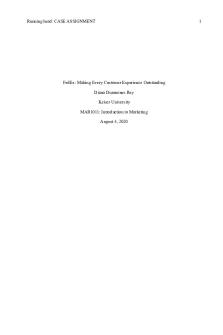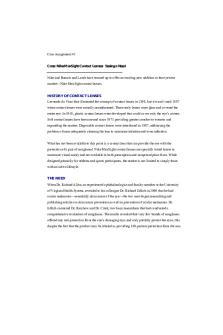Case 1 - Airbnb and Assignment PDF

| Title | Case 1 - Airbnb and Assignment |
|---|---|
| Course | Strategic Management |
| Institution | The University of the South Pacific |
| Pages | 4 |
| File Size | 114.6 KB |
| File Type | |
| Total Downloads | 9 |
| Total Views | 151 |
Summary
what are the strategies that Airbnb have to achieve a successful financial year...
Description
CASE 1
Airbnb in 2020 John D. Varlaro Johnson & Wales University
John E. Gamble Texas A&M University-Corpus Christi
Airbnb was started in 2008 when Brian Chesky and a friend decided to rent their apartment to guests for a local convention. To accommodate the guests, they used air mattresses and referred to it as the “Air Bed & Breakfast.” It was that weekend when the idea—and the potential viability—of a peer-to-peer room-sharing business model was born. During its 12-year existence, Airbnb has experienced immense growth and success. With a planned IPO at some point during 2020, Airbnb had been in a strong position to continue revolutionizing the hotel and tourism industry through its business model that allowed hosts to offer spare rooms or entire homes to potential guests in a peer-reviewed digital marketplace; yet, a global pandemic in the first half of 2020 seemed ready to derail Airbnb’s success. In 2018, the room-sharing company was in approximately 190 countries with more than 4 million listed properties and had an estimated valuation of $31 billion. By 2020, Airbnb had entered over 220 countries with more than 7 million locations. Airbnb’s business model has been successful by leveraging what is known as the sharing economy. As it grew, however, Airbnb’s business model was met with resistance. City officials and owners and operators of hotels, motels, and bed and breakfasts complained that, unlike traditional brick-and-mortar establishments that were subject to regulations and taxation, Airbnb hosts were able to circumvent and avoid such liabilities due to participation in Airbnb’s digital marketplace. In other instances, Airbnb hosts had encountered legal issues due to city and state ordinances governing hotels and apartment leases. Yet, an existential crisis for Airbnb now loomed due to the spread of the coronavirus (COVID-19). Many hosts were using Airbnb revenue to either subsidize their mortgage payments or had purchased properties that depended solely on the Page 1 of 4
revenue driven through booked accommodations. As people across the world sheltered in-place and travel restrictions were implemented to mitigate the spread of COVID-19, Airbnb and its hosts were left to navigate an uncertain travel and accommodation market with a business model that depends on everyday people sharing their own, at times, private homes.
Page 2 of 4
Assignment for Tomorrow 25th Nov 2021 case 1
Airbnb in 2020 Assignment Questions 1. How would you illustrate and compare the business models for Airbnb, large hotel chains such as Marriott and Hilton, and bed & breakfast operators? Use the example chart in the textbook for business models as a guide (Concepts & Connections 1.1)
2. What was Airbnb’s response to the COVID-19 pandemic? Does it appear that the company’s business model is more resilient than that of its hotel chain rivals?
Page 3 of 4
3. What are the general strengths and weaknesses of a) large, hotel chains such as Marriott and Hilton, b) bed & breakfasts, and c) Airbnb? Explain how you would compare and contrast those businesses.
4. In what ways has the lodging consumer changed, and how does Airbnb’s customer valueproposition meet this change?
When staying in a hotel turns out to be way too expensive and living in a hostel with other 100 people in a room doesn’t sound pleasant, the third option-Airbnb comes. The fact that a traveler can look at many options and find accommodations which suits him better either it is a bohemian or modern apartment is fascinating. Consumers have started to value direct and easy contact even more in the last years. This is when Airbnb stepped in and offered something that people have been waiting for. 5. What key factors may determine the success or failure of Airbnb?
Airbnb was able to win trust with its reviews and feedback systems, gain loyalty with rewards, and increase the user base with referential programs. Also, the sharing economy is one of the keys. They don’t own any actual property and can therefore be flexible. They provide variety of accommodation options at competitive prices. Airbnb is digital and this is the best place where to reach more users. 6. What recommendations would you make to Airbnb to improve its competitiveness in the accommodation market while mitigating any current and future risks?
My suggestion would be to work with hosts more to make sure there are no accommodations options with too many negative reviews as it might be spoiling the brand’s image.Also securing the travelers and imposing stricter rules for conduct.
Page 4 of 4...
Similar Free PDFs

Case 1 - Airbnb and Assignment
- 4 Pages

Case Study 1 Airbnb
- 6 Pages

Airbnb Case Study 1
- 2 Pages

Airbnb Case - Exploring Strategy
- 2 Pages

case study Airbnb
- 2 Pages

Airbnb Case Study
- 19 Pages

Airbnb
- 2 Pages

Week 1 Case Assignment
- 4 Pages

Assignment 1 case study
- 10 Pages

Assignment 1 CASE Study
- 9 Pages

Assignment 1 Zipcar Case
- 2 Pages

Case Study Assignment 1
- 21 Pages

Assignment Case 1
- 4 Pages

Assignment Case Study-1
- 6 Pages
Popular Institutions
- Tinajero National High School - Annex
- Politeknik Caltex Riau
- Yokohama City University
- SGT University
- University of Al-Qadisiyah
- Divine Word College of Vigan
- Techniek College Rotterdam
- Universidade de Santiago
- Universiti Teknologi MARA Cawangan Johor Kampus Pasir Gudang
- Poltekkes Kemenkes Yogyakarta
- Baguio City National High School
- Colegio san marcos
- preparatoria uno
- Centro de Bachillerato Tecnológico Industrial y de Servicios No. 107
- Dalian Maritime University
- Quang Trung Secondary School
- Colegio Tecnológico en Informática
- Corporación Regional de Educación Superior
- Grupo CEDVA
- Dar Al Uloom University
- Centro de Estudios Preuniversitarios de la Universidad Nacional de Ingeniería
- 上智大学
- Aakash International School, Nuna Majara
- San Felipe Neri Catholic School
- Kang Chiao International School - New Taipei City
- Misamis Occidental National High School
- Institución Educativa Escuela Normal Juan Ladrilleros
- Kolehiyo ng Pantukan
- Batanes State College
- Instituto Continental
- Sekolah Menengah Kejuruan Kesehatan Kaltara (Tarakan)
- Colegio de La Inmaculada Concepcion - Cebu

